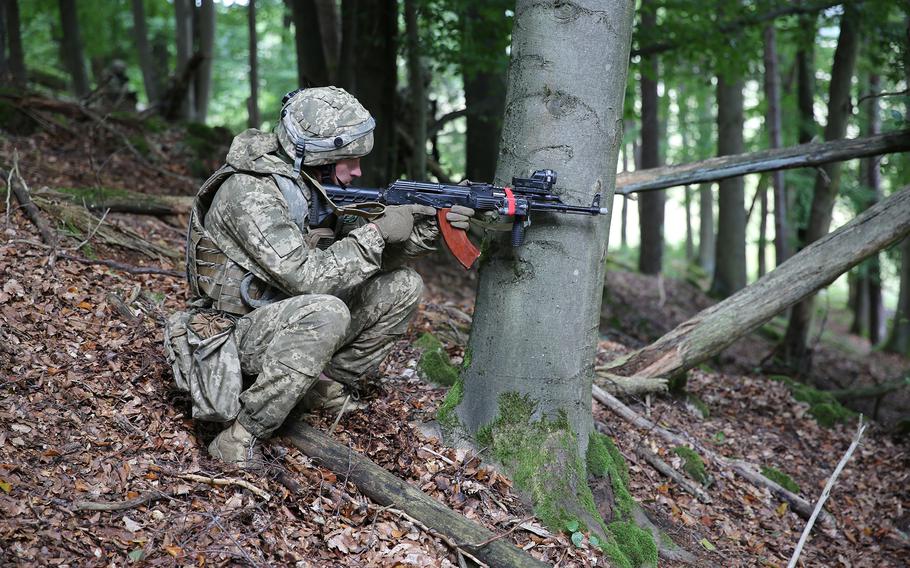Europe
Dual German-Russian citizens arrested for plotting attacks on US forces in Bavaria
Stars and Stripes April 18, 2024

A Ukrainian soldier returns fire on opposing forces during Saber Junction 21 at the Hohenfels Training Area in Bavaria, Germany, on Sept. 18, 2021. German authorities arrested two men Wednesday, April 17, 2024, alleging that they planned to target Hohenfels with attacks. (Shawn Pierce/U.S. Army)
GRAFENWOEHR, Germany — German police have arrested two men with ties to Russian intelligence, accusing them of spying on U.S. military bases in Bavaria and plotting attacks in retaliation for U.S. support of Ukraine in its war against the Kremlin.
The two men, identified only as dual German-Russian nationals Dieter S. and Alexander J., were arrested Wednesday by German special police in the town of Bayreuth, according to a statement Thursday from the German federal prosecutor’s office.
The U.S. military facilities that were surveilled included the Army training area in Grafenwoehr, located about 20 miles southeast of Bayreuth, the German news magazine Der Spiegel reported Thursday. Ukrainian forces receive combined arms and weapons training at the Army post.
The pair were charged with espionage and involvement with the pro-Russian terrorist organization Donetsk People’s Republic, the statement said. They are believed to have scouted U.S. bases in the country and planned attacks on military transportation routes on behalf of Russia.
Dieter S. also was charged with conspiring to cause an explosion and arson, and endangering security by photographing military installations.
Federal prosecutors have “achieved an investigative success in the fight against Putin’s sabotage and espionage network,” Marco Buschmann, Germany’s justice minister, wrote in a post Thursday on X. “We know that the Russian power apparatus targets our country, too. We must respond to this threat robustly and decisively.”
Dieter S. remains in pre-trial detention, according to the statement. Alexander J. was awaiting a hearing Thursday.
The arrests came along with police raids on the men’s homes and places of employment, the statement said.
American arms and training have been vital to Ukrainian efforts to repel Russian forces that invaded the former Soviet state on Feb. 24, 2022. In the two years that followed, the war has turned into a quagmire that has killed hundreds of thousands of people.
As of January, 19 Ukrainian battalions have been trained by U.S. soldiers at Bavarian ranges, Army officials said previously. More than 116,000 Ukrainian troops have been trained at more than 80 locations around the world.
The two would-be saboteurs planned attacks to disrupt the logistical support provided by NATO to Ukraine, potentially affecting facilities utilized by U.S. forces, the prosecutor’s statement said.
It’s unclear how German authorities were tipped off about the men, but it appears they were monitoring them for some time. The investigation revealed that Dieter S. took up arms and joined the separatist group, which fought for the region’s secession from Ukraine from December 2014 through September 2016.

German authorities arrested two men Wednesday, April 17, 2024, alleging that they planned to target U.S. military installations in Germany. The arrests were part of a broader crackdown on a Russian espionage network, according to German officials. (Dani Johnson/U.S. Army)
The group is reported to have used violence against the civilian population and was often involved in “intensive confrontations,” according to German authorities.
Since October, Dieter S. communicated with an unidentified person linked to Russian intelligence, prosecutors said. During the exchanges, he discussed sabotage tactics aimed at military and industrial infrastructure critical to Ukrainian defense, including U.S. and German military support.
Together, the men agreed to set off explosives at military installations and industrial sites in Germany, the statement said. Dieter S. collected information and took photos and video of military transports, materiel and U.S. installations in Bavaria, and then transmitted it to his contact, the statement said. Alexander J. provided assistance since at least since March.
Training missions for service members from Ukraine and other nations continue at Grafenwoehr, U.S. Army Europe-Africa officials said Thursday.
“The U.S. Army and the host nation have policies and procedures in place to keep us and the local community safe,” USAREUR-AF spokesman Col. Martin O’Donnell said in a statement.
O’Donnell added that the community can report instances of suspicious activity to U.S. Army counterintelligence at https://www.inscom.army.mil/isalute.